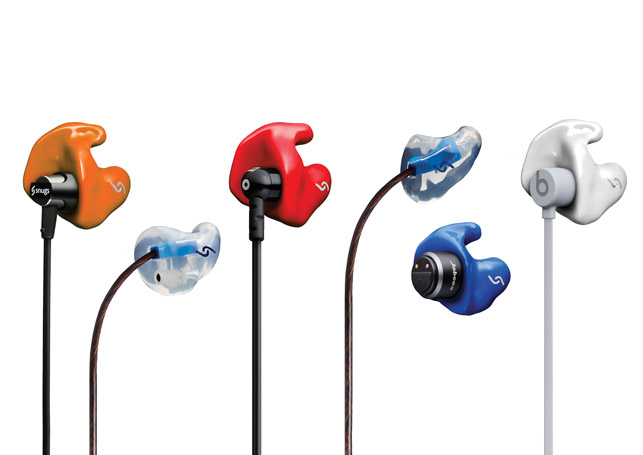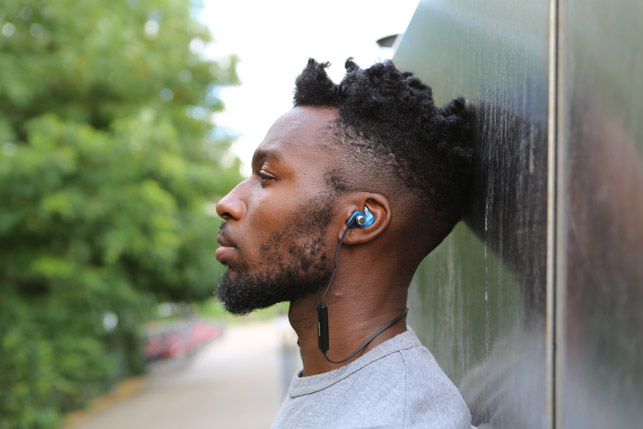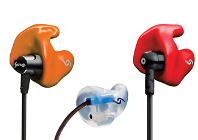
While the rise of the smartphone will dominate history books, alongside those chapters, skipping from device to device, will be the ubiquitous white earbuds.
For many, they are an everyday essential; used to make commutes, workouts, office environments and even the occasional mundane wedding service more bearable. However, despite the phones developing faster processors, improved screen resolutions and everything else, the headphones have hardly moved on.
“The last bit, that they haven’t done anything about is the sound, which is absolutely appalling!” exclaims Paul Jobin, MD and founder of Snugs, a UK earphones brand, before giving us a concise history of headphones, peaking with the brand Beats adorning Olympic athletes with headphones in 2012.
“Beats made headphones cool and sold headphones for £250 in the UK when they stuck them on Michael Phelps at the London Olympics!
“The music that people want to play and the things people want to do on their mobile phones are not being satisfied by the earphones.”
Jobin is a man who has built success on spotting trends before they arrive [remember the Yoyos craze of the late ‘90s? That was him], and sees the potential market of 2.5 billion people moving to custom fit, personalised earphones as the next big thing.
Snugs – Fit for purpose
“The concept that earphones are provided with a small, medium and large fit is so last century!” says Jobin of an industry he has tracked since working as a management consultant to PC Werth – pioneers of selling digital hearing aids in the UK, and creators of onstage in-ear monitors for British rock royalty.
While there, Jobin complained that his earbuds always fell out when skiing, so PC Werth quickly made him a custom-fit set.
Later, he observed his son’s struggles with a pair of earbuds. “My son was jamming the right one into his ear but couldn’t get the left one in – because all our ears are different – so being a father I said I’d get him a set made.”
This unveiled the limitations of the full consumer journey: “You have to go to an audiologist, you have to sit in a hospital or a medical centre.
“It was so un-consumer friendly that I thought there must be a better way to do this.”
As well as being longwinded and unnerving, the procedure was completely unscalable, using a physical substance injected into ears to manually cast moulds.
A 3D scanning method emerged in 2013, originally for producing earphones for submariners. At this point Jobin could envisage the potential of a full digital workflow for producing earphones, and snapped up the consumer licence for the scanner.
“I could see that there was a way at last in which you could… put a scanner in to every mobile phone shop, or every consumer store. “It was no longer a medical process of having to fill the ear with gunk, you use state of the art scanning technology to solve the imaging problem, and I saw the tech would be able to solve the manufacturing problem as 3D printers were already being deployed and clearly far better than manual casting.”
The goal was a custom fit experience that didn’t come at a huge cost, rather an add-on onto an existing mobile phone subscription.

Snugs uses scanning technology from 3Shape to create a true impression of your ears to ensure a perfect fit
Building the brand
The first step was to build the Snugs brand and position it online, with Jobin’s aim to have a lean, flexible business that would be able to pivot with each new technology that might arise.
Global logistics was outsourced to FedEx; production of the ear tips was to be done by one of the world’s largest hearing aid producers, Dreve in Germany, and Snugs set out to make the scanning process even more consumer friendly by working with 3Shape.
Experts in dental scanning, 3Shape developed the Phoenix oral scanner, a nonintrusive, handheld unit.
The nature of the scanner and the process mean that the device is now operational at Snugs retail outlets in key department stores, including Selfridges, London, Brown Thomas, Dublin and Grand Audition, Paris.
The next stage of Snugs was launched at CES 2018, allowing customers to scan their ears using a smartphone app, Snapp. The app digitally compares a standard photograph of each ear to a database of hundreds of preprogrammed ear-shapes, which although less accurate than a fully fitted pair, the tips are likened by Jobin to an ‘off the peg’ suit when compared to the Phoenix-scanned bespoke ‘Saville Row’ offering.
The process allows the customer to be anywhere in the world, manufacturing costs are lower, the tips fit comfortably and don’t fall out, and as they’re not aimed at audiophiles, some outside noise getting in can be a bit less daunting for the wearer (the perfect seal of a fully custom pair offers 30db of noise isolation).
The move puts them in contention to work with tier one headphone brands, licensing their tech to them – companies that now send them the CAD data for their products so that the models can be updated in Snugs’ database ready for production when needed.
The next stage is the introduction of 3D printing and a fully automated service.
“We know that one size does not fit all, when you have the ability to 3D print then we are a beautiful application for 3D printing because we only make one – not ten or dozens or a hundred. The 3D printed moulds will be produced in the US, with each 3D printer producing around 500,000 pairs a year.
The vision is to scale this production volume, while scaling down the size of the 3D printers used, creating a ‘Kodak Mini Lab’ style set-up.
Eventually the target is a print in store ‘while you wait’ service – all of this licensed out to earphone brands around the world.
The scope for the technology is huge. An estimate puts the earphones market at 2.5 billion people, not to mention the potential for the ‘hearables’ market.
An in-ear device can potentially measure heartbeat, oxygen levels and core body temperature at the same time, while allowing for an audio channel in – the next stage in the fitness and wellbeing wearables market.
Whatever the next developments, personalisation remains the key, and Snugs is setting out to take advantage of digital design, manufacturing and distribution to create a noise about its products.

Custom earphones, tailored to fit, thanks to a fully digital workflow
Default






